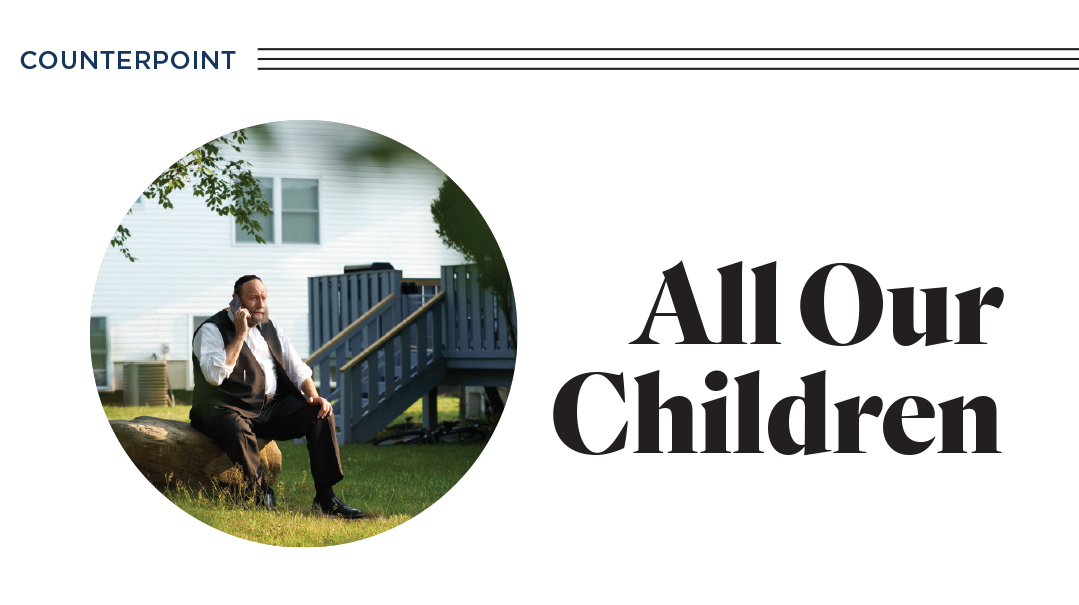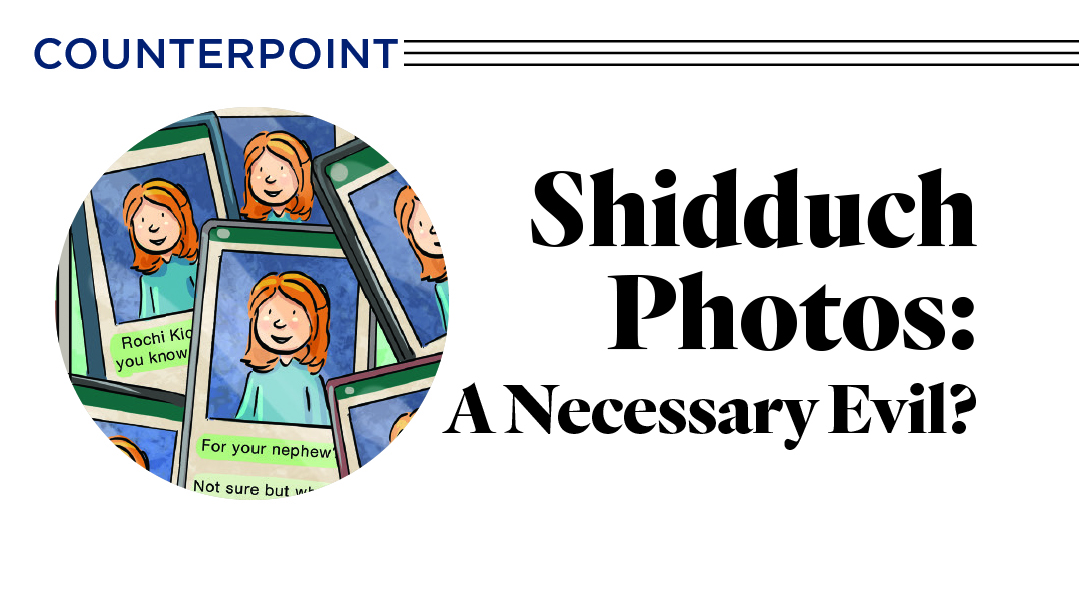Going Broke: Teens Speak Up

Teens weigh in on an Inbox letter from a mother who’s forgoing purchasing a dining room set because she thinks it’s more important to say “yes” to her teens

Real Connection — E.Y.M
I
’m not a parent, I’m not a teacher, and I am not even an adult. I’m a teenager who attended camp, is in high school, is the youngest, and often called “spoiled” by my siblings. I went to a mainstream camp for two years and I attend a regular Bais Yaakov high school, not even out of town. I am far from being a mother, but since when is “no” unacceptable?
Do we really think that by giving in to our children, we will raise a generation of happy, independent adults? I think the opposite will happen. By caving in to whatever your child asks you for, you are ruining your child’s life. I’m sorry to say it as such, but that’s the harsh reality.
No, your daughter’s third pair of brand-name shoes should not come before your dining room set. If your child has never heard the word “no,” where will she end up later, far down the line, when faced with rejections such as seminary and shidduchim? Her entire world will come crashing down because her mother will not always be there to pull the strings and swipe the card.
If your daughter goes to camp with only 13 shirts and not 25, she will survive. I promise. I did. It’s true that society judges people by their clothing. But let me tell you — the kids with the most friends weren’t the ones with the most clothing. And the kids with the most clothing did not have the most friends.
Children need to be taught from early on the difference between needs and wants, as well as that money does not grow on trees. Did I ask my mother to buy me stuff that I knew, deep down, I didn’t need? Yes, I did. And she sometimes said no. Was I disappointed? Sure. But that’s what we grow and learn from. Saying no to your child will not, as you put it, make the child feel “the sting of rejection.”
This relates directly to the concept of tefillah. Hashem loves us very much, and for that reason he does not give us everything we ask for! When a tefillah isn’t answered, it’s not because Hashem isn’t listening, it’s because sometimes, as our loving Father, He answers with “no.” He does not give us that which isn’t good for us.
You say that it’s important to know all the current teen styles and trends, because otherwise your children will feel a lack of connection. Question: Are you insulted when you mention a floppy disk and we have no idea what you’re talking about? Or are you upset and feel like you’ve lost a moment of connection when you say something about a rotary phone, and all you get in reply is a look of confusion? Of course not! You grew up in a different time than we did. Today is no different.
I don’t feel rejected or misunderstood if I mention one of today’s latest styles and all I receive is a blank stare from my parents. It’s normal and it’s okay. We appreciate when you know what we’re talking about, but we are in no way upset that our parents are unaware of the styles. It’s a fact of life.
A real moment of connection is not the swipe of the credit card. It’s taking a walk with your mother after a stressful math final. It’s sitting on the porch swing Shabbos afternoon, schmoozing. It’s spending time in the kitchen together Thursday night, cooking for Shabbos. It’s spending hours of time in the car, learning to drive, laughing and discussing real topics of interest. These are real. Buying that shirt? That’s superficial. Because by next week, it won’t be new anymore and she’ll come to you asking for something else.
Yes, we children want to be treated with respect and consideration. But the line has to be drawn somewhere. A mother’s job is to give her children tools they need in life. And coping with “no” is perhaps the biggest of them all.
Glorifying the Superficial — S.T.
A
s a 16-year-old high school girl, I have followed the extensive back-and-forth generated by Mrs. Adelman’s article about camp expenses the past few weeks with some interest. But this week’s letter by M.E. left me stunned and disturbed. I know I’m young and dumb, but in my humble opinion, there were some very crooked insinuations as well as straight-out krumkeit in her perspective.
I agree that it is essential for parents to respect their children’s wants, to make them feel understood and valued, and to give them consideration and validation. I also think that it can be important to provide kids with sometimes expensive extras. I myself have the most wonderful parents who do all that and much more. I definitely think that being provided with more than the barest necessities can be integral for a child’s emotional development and an opportunity for connection and relationship, making them feel valued and loved. And no, I am not a deprived child who sleeps in a drawer.
But.
To say that “Your daughters’ lives do depend on clothing, for now. To get the result we all strive for — children who grow up to be emotionally healthy and spiritually healthy adults — we need to take a superficial side trip to get there,” or that by doing this “we are giving them the emotional space to grow to become adults with solid values” is decidedly warped.
According to everything I’ve learned, and to what I know intuitively, “spiritually healthy” means having Torah-true hashkafos and priorities and living according to those values. Do you really think that taking a “superficial side trip” of valuing and prioritizing expensive possessions and brand-name clothing results in balanced, well-adjusted adults who have proper hashkafos and know what truly matters? That a “superficial side trip” will lead to non-superficial, developed, and growth-oriented parents, teachers, and role models? How is the “superficial side trip” message congruent with the “emotionally and spiritually healthy” goal?
I am a teenager, and yes, it is important to me to look good and have the right things. Sometimes my parents say no, but they often say yes. But I know, as do my parents know — in fact, I know because my parents know — that the stuff they provide me with so I’ll feel that my wants are respected, so I can be secure and successful, is not the stuff they value, and it’s not the stuff they want me to value. And honestly, I am a lot less obsessed with brand-name clothes and shoes than a lot of my peers.
How can you say that valuing the superficial leads to “good, smart, empathetic beings who strive to be better?” Pardon me for suggesting that the “superficial side trip” does not lead to sound spiritual and emotional health — it leads to a superficial highway and a superficial destination.
I wonder if idealizing this derech of chinuch may be contributing to today’s generation shallowness and image-consciousness. If one must give their children “superficial side trip” chinuch, at the very least they should not glorify it and delude themselves and others into thinking that it will help their children become serious ovdei Hashem.
The Gift of "No" — M.R.T
L
ast week, M.E. wrote that parents must always say yes to their children because “our children will then grow up to be emotionally healthy adults.” I am the farthest it gets from motherhood, at 16 years of age, yet this issue affects people my age. The words our parents choose to answer carry lots of weight, even if it’s a simple word like “yes” or “no.”
Does M.E. think there is an abyss being formed when a parent says “no”? That if we don’t get our way, we’ll feel rejected? Personally, I don’t remember half my requests from this year, forget about last year. What I do remember, and will always remember, is working with my father, sitting on the deck schmoozing, BBQs with all the extended family, and after a long stressful fun-filled night, letting out our stress over a bottle of soda.
My parents fall under the category of “old school” but in my opinion it’s the “best school.” My parents teach us the value of money, and the difference between want and need. They teach us that before your second Shabbos outfit comes one for the poor, before your third pair of everyday shoes comes a meal for the hungry, before your brand-name something come the meat l’kavod Shabbos kodesh. And perhaps most importantly, before we spend money on gashmiyus we spend it on what really matters: ruchniyus, seforim, etc.
Although my parents engrave these lessons, they still often say yes to things we really only want, not need. My parents get us all we need. And when it gets too much, then they teach us the next lesson of “no, nothing is free, we can’t buy everything, so if you want it, then you buy it.” Most of the time when we buy it, our parents were right — we really didn’t need it — and it spends its life getting dusty on a shelf.
For the most part my parents say yes, but with all these yeses, there is a rare, important “no.” And even though the “no” might deflate us briefly, in the end it makes us better than before.
(Originally featured in Mishpacha, Issue 770)
Oops! We could not locate your form.






Comments (0)